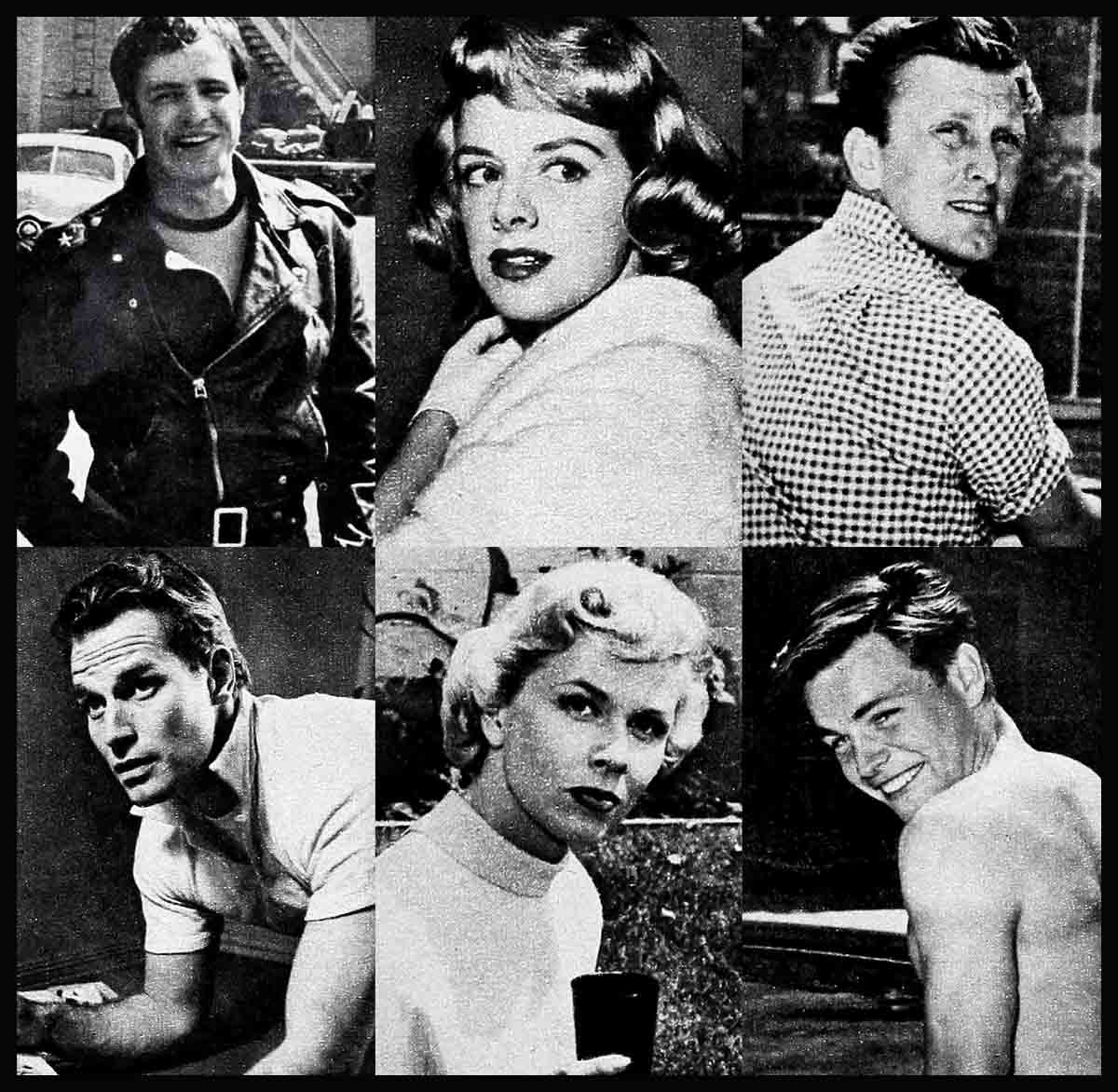
Come Out Of That Star Spin!
With things as tough as they are in Hollywood the Big Heads are of necessity shrinking. But there are still enough swollen hold-outs to make a movie reporter’s life as nerve racking as a roller coaster ride in 3-D.
Take Bob Wagner for instance. Bob is a cute boy, but it’s obvious his success has rushed to his ego. John Wayne will let you take photos of him upstairs, downstairs, and in milord’s chamber—he even allowed a PHOTOPLAY photog to follow him around for a week in Acapulco—but little Bobbie Wagner alluva sudden says his home is his castle and trespassing for publicity will be prosecuted. Whereas at the beginning of the climb, he was willing to throw open every nook and cranny, with granny thrown in for good measure—just so you got his messages over to the public.
Another thing—and this happened recently—Robert has charming parents, and they brought him up well, and he didn’t have to pointedly pick up a paper and pretend to read in the middle of a lady reporter’s questions. He’s never done this to me, and he’s a nice boy and I’m sure he’ll come out of the spiral. But with so many other people getting mad at him, I’m worried. It’s been said before, but this is a good time to repeat it as a friendly warning for Bob: Be nice to the people you meet on the way up, because you might meet the same people on your way down.
Jennifer Jones made the jump from obscurity to stardom so quickly, it’s hard for me to remember what a sweet girl she was before the release of “The Song of Bernadette.” It won her the Oscar and changed her from a frank, happy, friendly character to a tense, brooding, seemingly-suspicious-of-everyone person. Even Garbo posed with lions and did cheesecake photos—i.e., showed her stems—in the early years of her career before clamping down into the Great Silence.
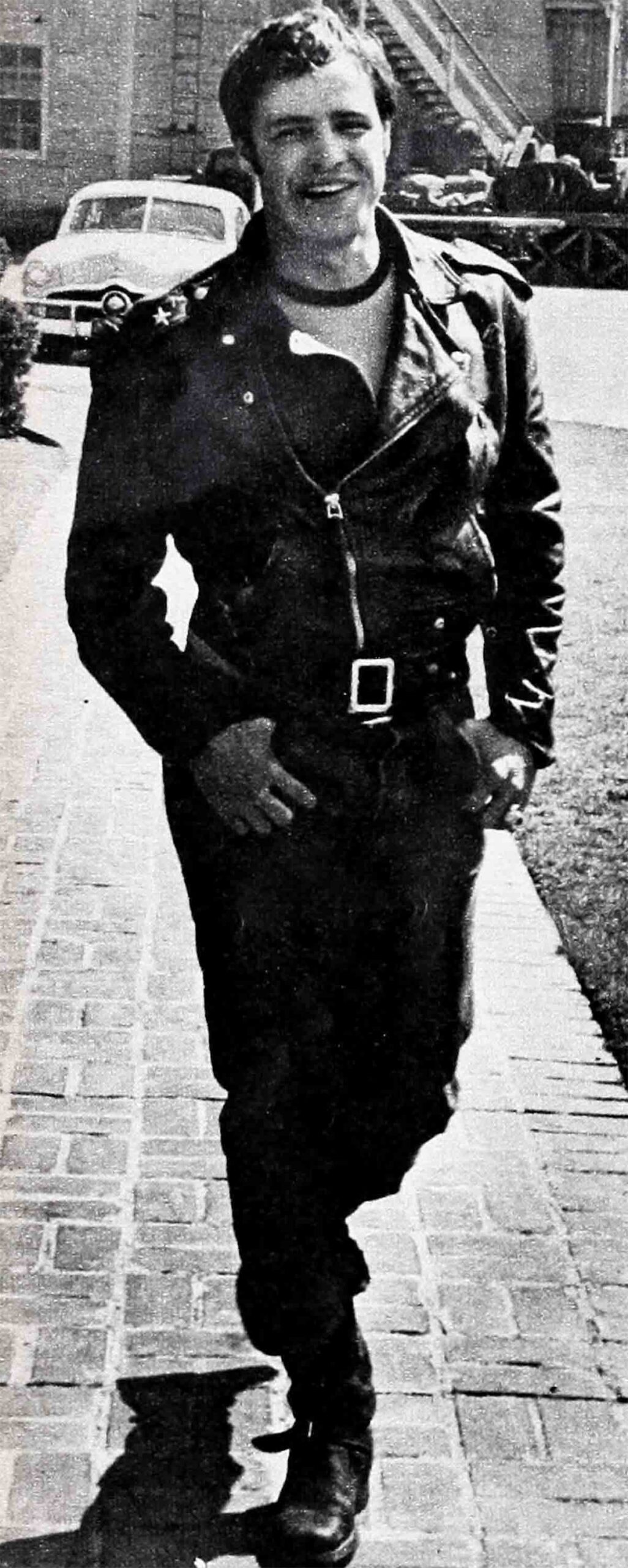
To my knowledge, Garbo, did not exclude still cameramen from the set when she was working, because she was smart enough to know that publicity is necessary for selling a picture. But even though Jennifer wears a swim suit in “Beat the Devil,” magazine photographers were excluded. And the list of do’s and don’ts made most of us here say, “Why bother?”
Kirk Douglas, than whom there is no whomer in the swelled-head department, gets mad when you tell him that success has changed him. “I’ve always been the same,” he insists. “The only difference is, success allowed me to be myself.” I prefer to think there was a time when Kirk was modest about his ability—which is real—that he sometimes used sentences that didn’t start with “I.” That women, once in awhile, were companions, not conquests.
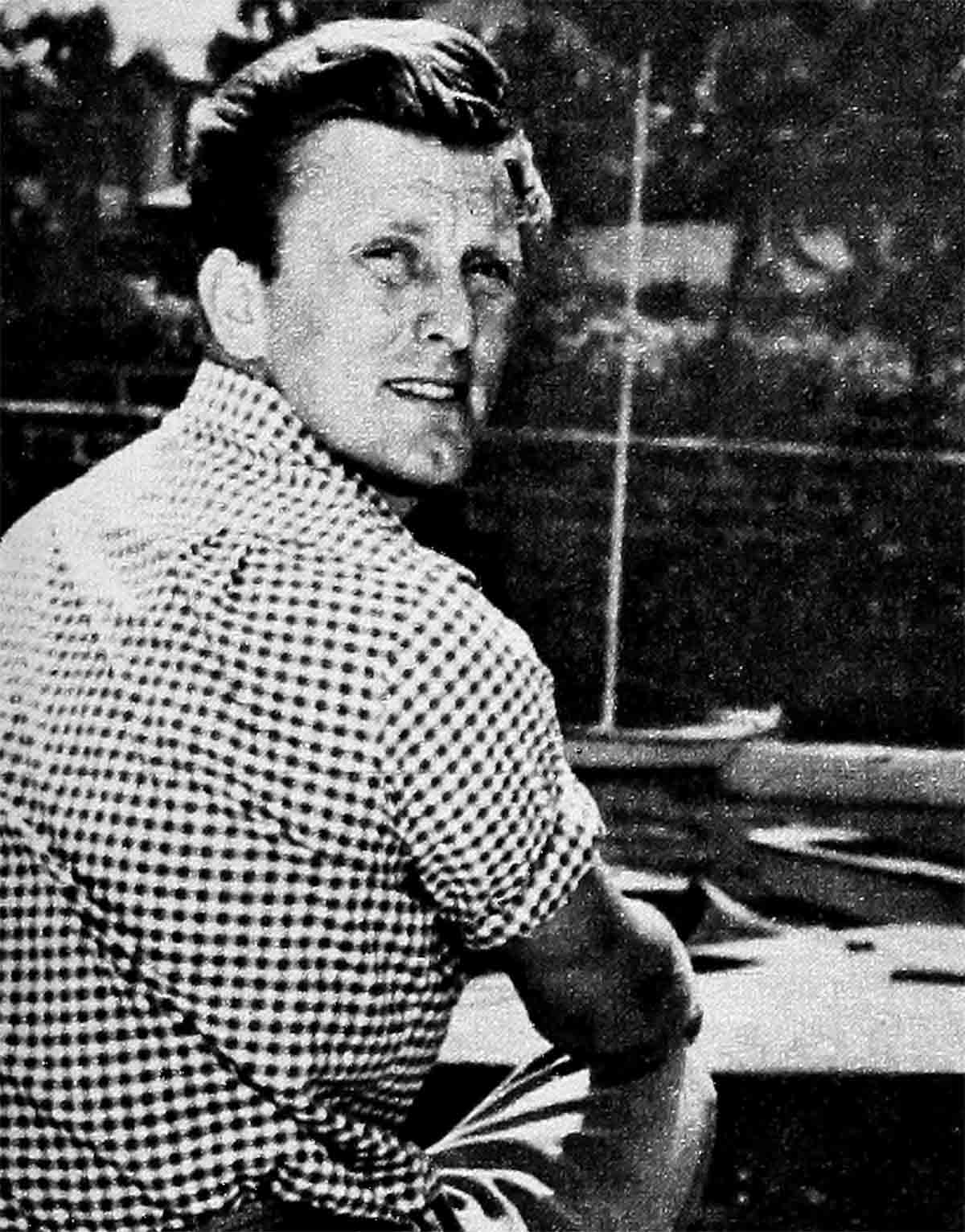
Doris Day, who was Miss Eager Beaver of 1948 when she first came to Hollywood, has done perhaps the biggest flip-flop in the head department because of her success. Her excuse for refusing home photographs now is that she has new white carpets. But when she didn’t have carpets, I’m sure it was all right to roll up the rug and dance, sister, dance! She won’t even pose around the tennis court—unlike June Allyson, who’ll give her home and her life’s blood, if it will make you happy.
Miss Day has also developed a faraway manner that she didn’t have at the beginning. There was never a more forthright girl than this blonde ex-chubby-faced singer used to be. Her husband, Marty Melcher, is said to be the main spring behind the change in Doris. But I’m told that even he has trouble pinning her down to anything definite. Like when he said, “Let’s go to Yosemite.” Doris: “Uh huh.” Marty: “When shall we go?” Doris: “Oh, some day.”
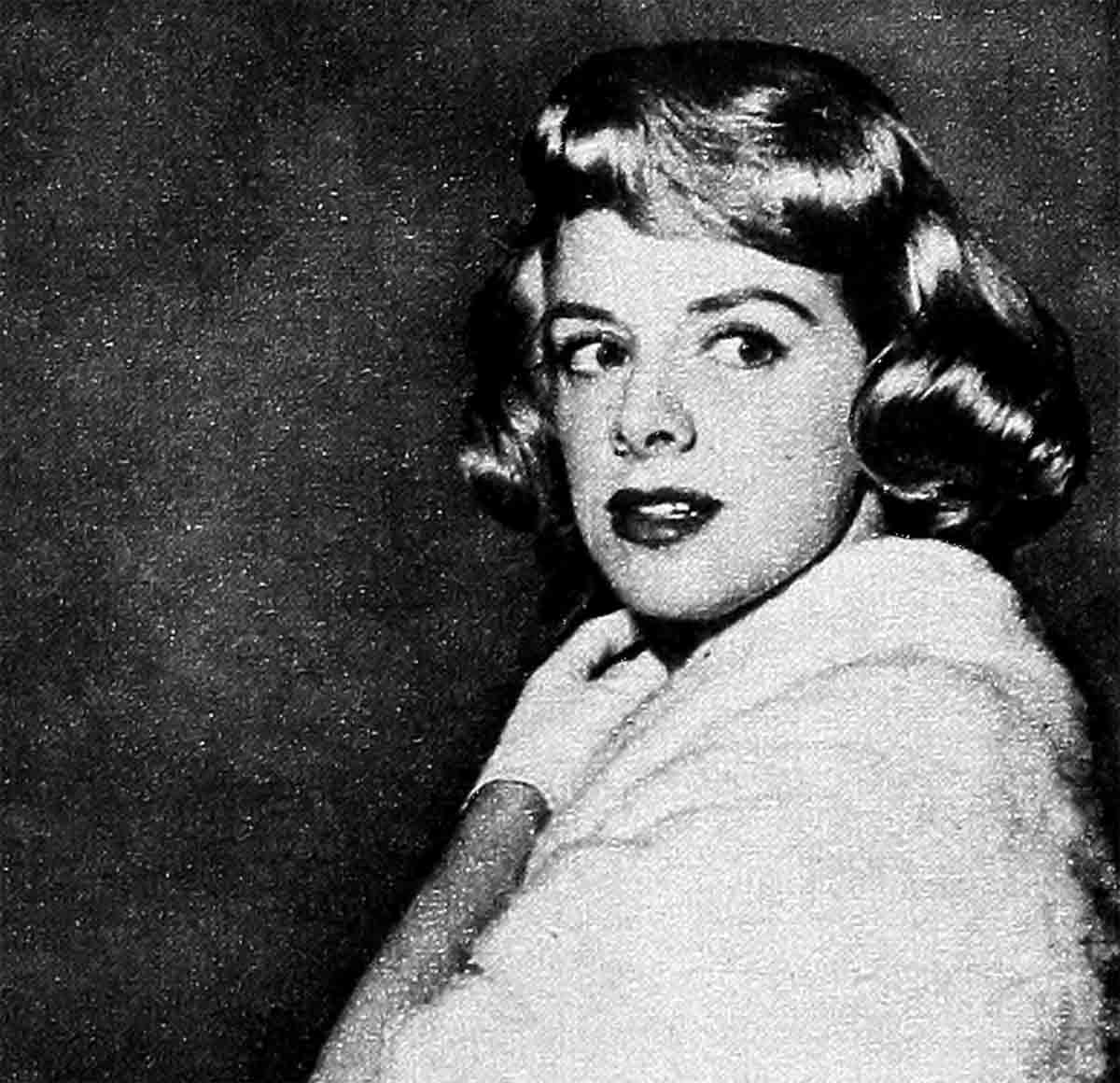
You can’t start too young to believe your publicity, apparently. There’s Joanne Gilbert, who was hailed as a new Judy Garland when she sang here at the Mocambo. I missed the first night, but after reading her great notices, I went the second. She was great for a girl of nineteen, but this was no Judy Garland. The impetus of the raves, however, propelled her to top money in top night clubs across the country. Maybe Joanne wasn’t sophisticated enough for New York. She didn’t pack the house there, and when she was asked to take a cut, she ducked out to her sunny screen career in California—leaving a couple of TV and radio commentators who had dates with her, with egg on their faces, and no Joanne on their show.
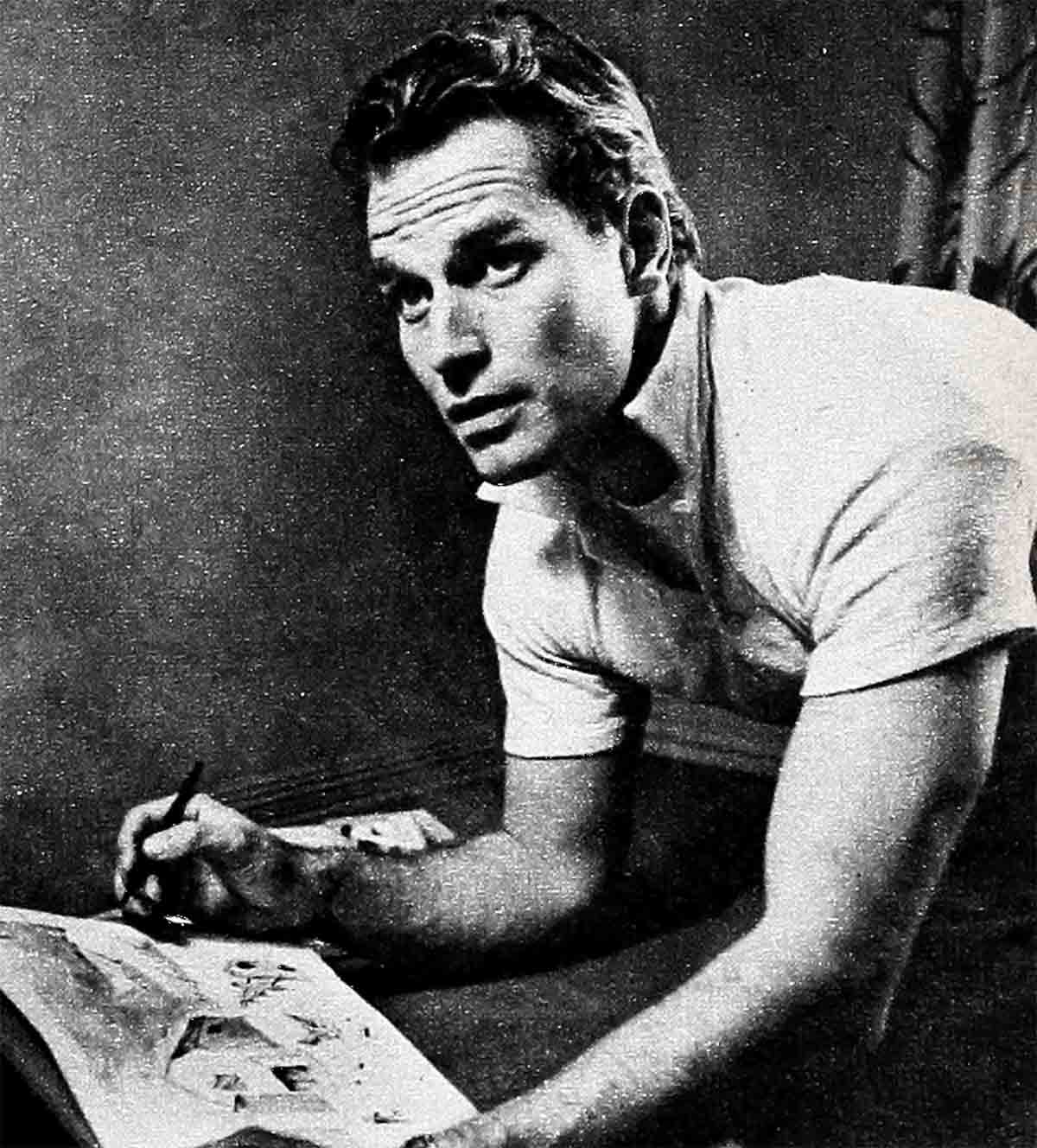
Now Marlon Brando is quite different. He just sees no one. He believes he’s extremely logical with his excuse, “I’ll only talk with the legitimate press.” But he has never explained what he means by “illegitimate.” And his idea of fun is to get a mate for his revolting racoon. Or to call columnists and say, “I’ve just married Movita,” then hang up. And if the caller isn’t Marlon, then the hoaxter does an awfully good imitation of him.
They say that winning an Oscar went to Gloria Grahame’s tousled blonde head. But I don’t think so. Gloria has always been vague. You talk to her and she’s miles and miles away. But she’s always grateful for good reviews without believing, “This is it, I don’t have to do any more.” But Gloria was confused, almost sick with the excitement of winning the gold statue. And when she came out of the spin, she called everyone who had complained, to apologize. How humble can you be?
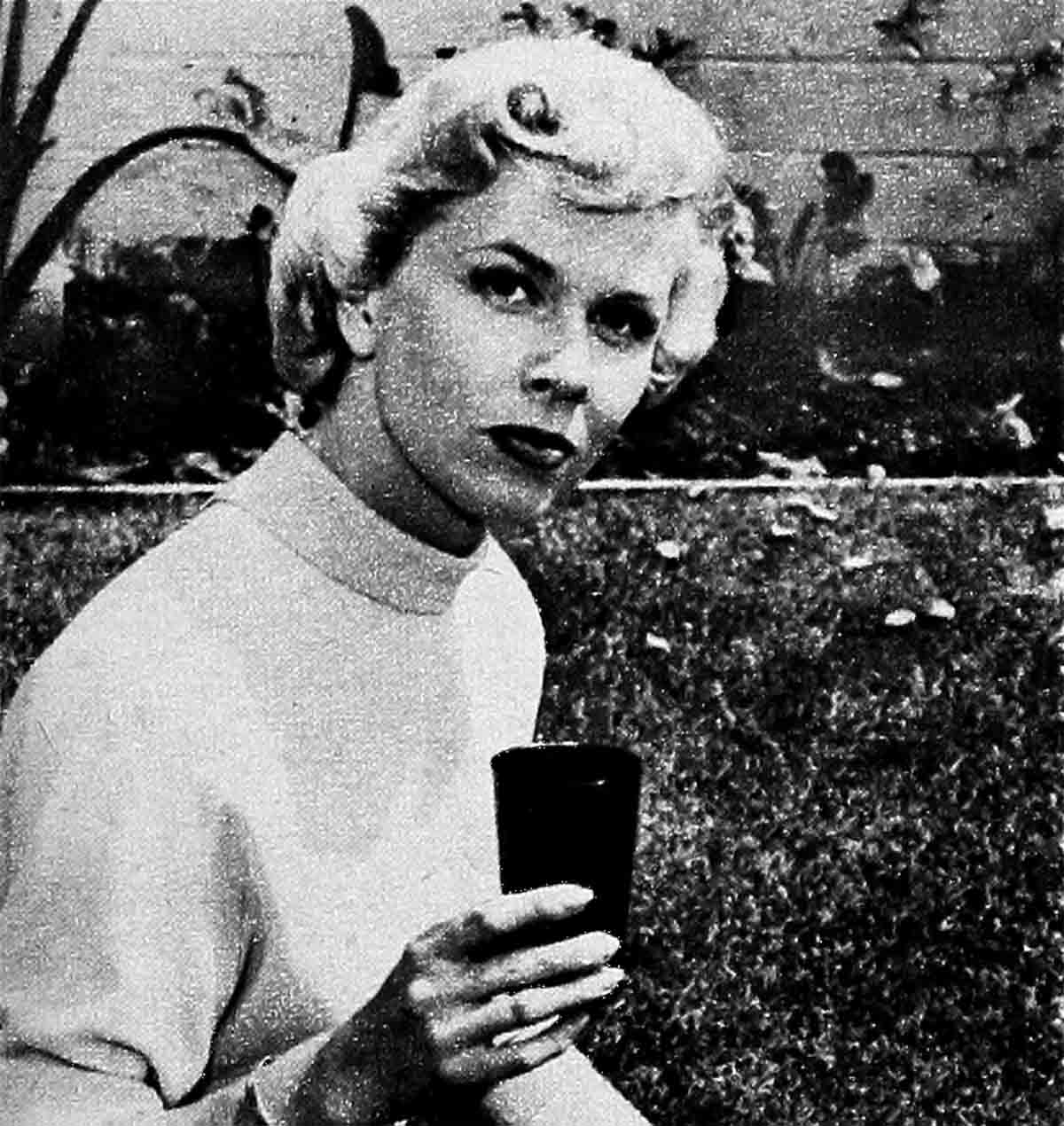
There’ve been lots of murmurs against the Monroe Doctrine—Marilyn’s that is—that she used to break her neck to be pleasant to everyone and doesn’t have time now. But if this blondeshell were to try to be nice to everyone who wants to be nice to her, she’d really have to be five people. Imagine, after “How to Marry a Millionaire,” Marilyn had eighty-seven interviews! Sure, she keeps everyone waiting on the set—that’s our Marilyn. She just can’t seem to get ready. But if she is more swelled since her success, it certainly isn’t in the head department.
Britisher Dick Burton is another new star accused of taking it big. But he has a sense of humor, which can be a life and popularity saver. When a columnist wrote that he was wearing a bigger size in hats, he asked his wife to measure his head, and reported back to the tattler. “By golly, you’re right, my head has grown an inch!”
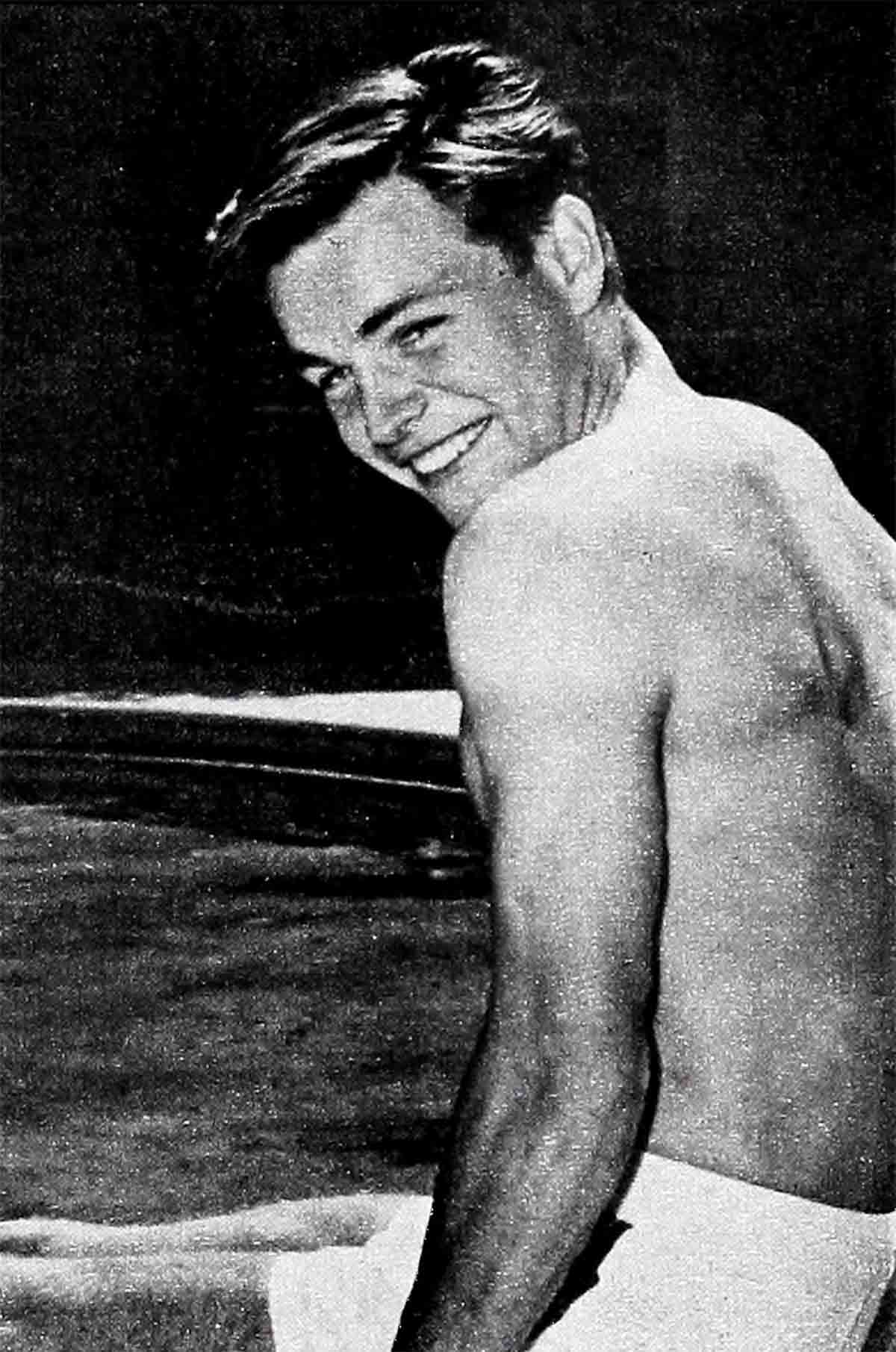
Gene Kelly has his detractors who say he has always been snooty. But there’s a difference between conceit and concentration on the job in hand. I’ve learned never to interrupt him on the set when he’s setting up a scene. He just doesn’t see you. Anyway, I guess Gene can afford to be high-hat from now on in. He cleared half a million dollars on his eighteen months’ tax exemption abroad.
Charlton Heston was friendlier the first year, although I haven’t had too much to do with him at any time. He’s been busy and so have I. But some of the lady stars who spell their names in lesser lights, report that Charlton snubs them. They say he’s okay with top-notchers like Susan Hayward, but gets busy between scenes when his co-star is of lesser calibre.
I have to write as I find, and Dale Robertson has never been high-hat with me. But others report differently. One day I’m going to sit down with Dale and try to find out what it’s all about—the repeated rumors of marriage trouble and complaints of the press. Dale reportedly told his studio head he’d had too much publicity!
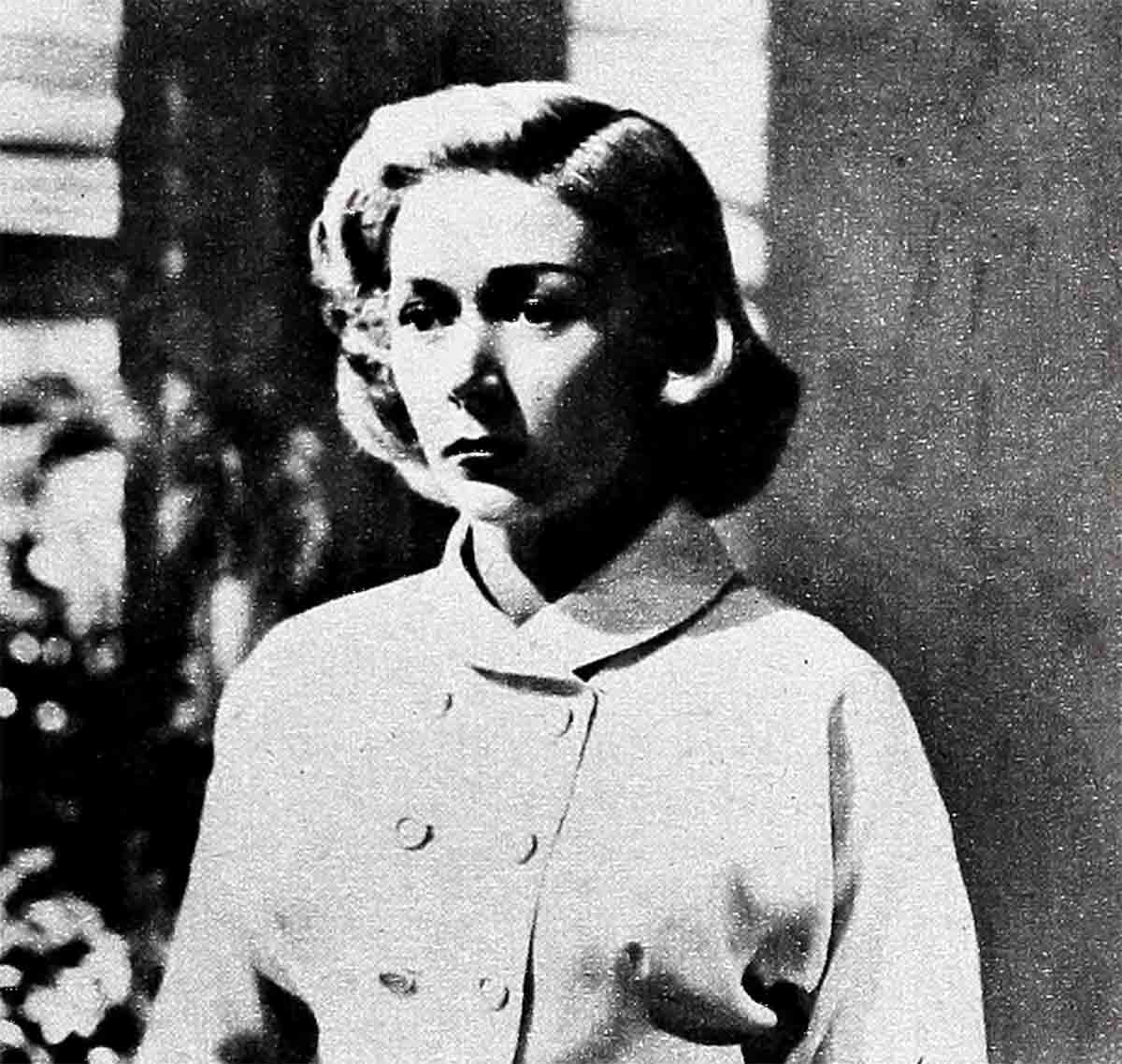
If anything, Betty Grable has become more home-folksy since her success. She made the grade and she doesn’t have to impress anyone. She’s kept the same friends—her closest is still her hair dresser. But she just can’t be bothered with publicity or the press. This doesn’t mean a swelled head, and you can’t say she’s stupid, because she’s still collecting $300,000 a year. Wouldn’t you love to be stupid like that?
The other day, at Robert Stack’s cocktail party, I met David Lewin, movie critic for the London Daily Express, and asked him, “Why did the British go overboard for Danny Kaye at the Palladium?” “Because,” said David seriously, “he followed Mickey Rooney—whom the British didn’t like at all.”
But Danny is reportedly not quite as popular with royalty these days. And you can trace it back to the time he posed for a photograph at the Café de Paris, with his arm around the Duchess of Kent’s chair. Unfortunately, she was in it, and that simply is not done in England, my dear. I guess Danny has learned that if you can keep your head when all about you are losing theirs over royalty, you’ll remain more friendly with them.
Tops, of course, in this kind of snobbism, is the son of that old swashbuckler, Douglas Fairbanks, Jr. When you phone his home in Kensington, I’m told, his butler answers, “Sir Douglas Fairbanks’ home,” even though the Court Register refers to our Doug as “Mr.” But you have to hand it to this Hollywood boy. He did get Queen Elizabeth and the Duke of Edinburgh to dine with him. But he too apparently lost his equilibrium in such exalted company, and allowed the news to seep into the press, causing dowagers to choke into their tea and crumpets.
To get nearer home. I didn’t know Rosemary Clooney before she came to Hollywood, but when I met her at a Santa Monica beach home, she seemed a nice, average person whom you wouldn’t pick out in a crowd. Later I heard reports of broken dates with irate reporters in Gotham. I can’t judge her too harshly on that score, because I broke a date with Rosey myself when I had laryngitis. She evened the score by cutting three with me!
But it’s hard to understand why Miss Clooney dropped friend Jackie Sherman overboard, after her big hit at Paramount in “The Stars Are Singing.” Jackie, who has lots of money, was like a godmother to Rosemary in the early days of her struggle. Rosie had free run of her apartment at the swank Hampshire House, and Jackie even worked as her secretary at the time to make a good showing of success for the singer. I don’t know whether it’s because Rosemary can now afford to pay for these luxuries herself, but anyway, Jackie doesn’t Come-on-a-Her-House any more.
It was a combination of career and Marcus Goodrich that re-shaped Olivia de Havilland’s personality. Now that he’s gone, she sounds like the old Livvy. But she listens with her eyes, not her ears, or vice versa, I can never quite tell which. I only know that she isn’t quite with you, and that’s always disconcerting.
For awhile there, Anne Baxter was impossible. You know the type, always on the run just as you get set to say something. But when she tossed John Hodiak out of her life, she took the bit, not to mention the cigar, between her teeth, and tried to lose the lady in her. You’ll never do it, Annie. Something between the old Anne and the new would be right.
Like Shelley Winters; no matter how many expensive dresses she buys Shelley will always look overdressed. When I saw her at a fashion luncheon the other day she wore a high-necked, long-sleeved, blue silk dress, with long blue gloves and a bunch of orange blossoms and blue veiling atop her head. But all she accomplished was an imitation of the Squire’s lady in the country about to open a charity bazaar. But for all that and for all the temperamental shenanigans, Shelley has always been very humble and respectful towards talent—and that includes her husband, Vittorio Gassman, touted by his bride as the greatest actor in all of Italy.
Except at the very beginning, when he was making “Wuthering Heights” for Sam Goldwyn—no one knew him here then—I have always found Sir Laurence Olivier a completely pompous personality off the screen. Poor Vivien Leigh, she not only couldn’t cope with the demands of success, she floundered and sank under the heavy burden. Some people believe her collapse was due to trying to keep up with Olivier. She reminds me of Robert Walker, but I hope she’ll be able to pull out of it.
It was never a swelled head with Bette Davis—she just grew more irritable with success. Whereas Hedy Lamarr’s rush to the heights was accomplished with a rush of mis’ries born of a belief that life still owed her something. Can you think of anything she hasn’t had?
Cary Grant has remained more or less the same during the last decade, although there’s usually a cynical, half smile on his lips—a “Who cares?” attitude . . . Farley Granger, who was so eager, is now so bored . . . But there’s no change with Virginia Mayo. This gal is a dream! And Alan Ladd is as thoughtful today as when no one except Sue knew or had faith in him. And Bing Crosby—he’s the same casual, exasperating, but wonderful guy . . . Greg Peck? His success went to his marriage—or is it merely the dangerous age? No bigger hat for Robert Taylor, who prefers his pilot pal to all the big shots in Hollywood . . . Ann Blyth hasn’t changed an eyelash—always kind—she practices her religion, never preaches it . . . No change for George Sanders—he was always a clinker in my book.
It’s interesting that the two biggest sweethearts in Hollywood are the two biggest hits on television—Lucille Ball and Donald O’Connor. Can it be there’s no room for a swollen head or time for temperament in the faster medium of TV? It’s something for movie star bigheads, who might get bogged on the beach of yesterday, to think about.
THE END
—BY SHEILAH GRAHAM
It is a quote. PHOTOPLAY MAGAZINE SEPTEMBER 1953




